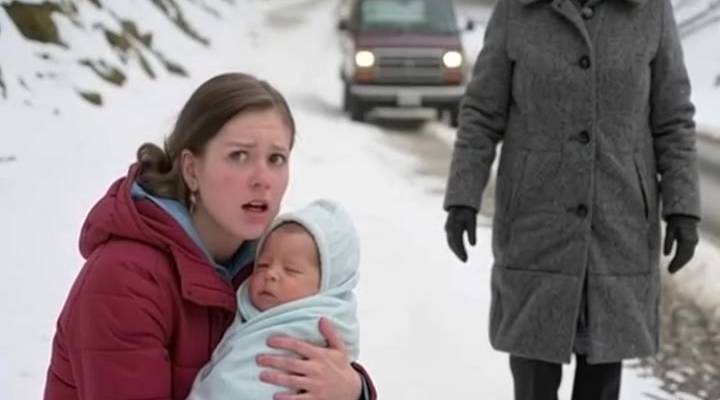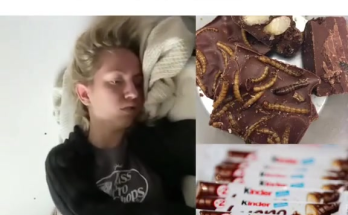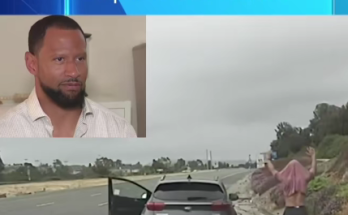
The night my world collapsed, it smelled faintly of lavender detergent and burnt
toast. My mother had been making herself a late snack, and the bread had
stayed in the toaster too long, turning black at the edges. That smell mixed with
the sharpness of her words, words that will never leave me: “If you’re going to
keep that baby, you can’t stay here. I won’t have it.”
toast. My mother had been making herself a late snack, and the bread had
stayed in the toaster too long, turning black at the edges. That smell mixed with
the sharpness of her words, words that will never leave me: “If you’re going to
keep that baby, you can’t stay here. I won’t have it.”
BEFORE
Doctor In Chicago Reveals A Simple
Way To Shrink A Hanging Belly!
LULUTOX
I was seventeen, holding my breath to keep from crying. My father stood in the
doorway, arms crossed, his silence more brutal than my mother’s anger. He
wouldn’t look at me, and that hurt most of all. In his eyes, I could see shame,
disappointment, and something like disgust.
AFTER
1.
5.
2.
6.
7.
4.
UNCLAIMED FUNDS FOR MY
NAME
BEST COLLAGEN FOR WOMEN
OVER 60
- BEST SHAMPOO FOR HAIR LOSS
CHECK YOUR NAME FOR
UNCLAIMED FUNDS
8.
10 BEST CAR INSURANCE FOR
SENIORS
TOP 5 COLLAGEN BRANDS TO
AVOID
CASH EMERGENCY ASSISTANCE
UNCLAIMED STIMULUS CHECKS
BY NAME
My hand instinctively covered the small swell of my belly. I was only four months
along, barely showing, but enough that my secret could no longer be hidden
under baggy sweaters. I had been terrified to tell them, but a tiny piece of me
had hoped they would soften, that they would remember I was still their
daughter. I had been wrong.
That night, with nowhere else to go, I packed a duffel bag with the essentials
clothes, my toothbrush, my schoolbooks, and the sonogram picture I kept
tucked inside a notebook. My parents didn’t stop me as I walked out the door.
My mother turned her back; my tather lit a c.i.g.a.rette on the porch, his tace
hard as stone. The door clicked shut behind me, and just like that, I was no
longer their child.
I wandered for hours through the quiet streets of our small town. The air was
cool, the lamps casting long shadows on the sidewalks. Every step I took felt
heavier. Where was I supposed to go? My best friend’s parents were strict and
religious; they would never welcome me. The boy responsible-my boyfriend at
the time-had already disappeared when I told him the news. “I’m not ready to
be a dad,” he’d said, as if I were ready to be a mom.
By midnight, I ended up at the park. I sat on a bench, clutching my bag, my
stomach twisting with fear and hunger. The night pressed in, and I realized I had
never felt so alone.
And then, the strangest thing happened.
A figure appeared down the path, moving with surprising energy for someone
clearly past her seventies. She wore a long purple coat, mismatched gloves-
one red, one green-and a scarf wrapped three times around her neck. A wide-
brimmed hat covaxed her head, though tufts of silver hair stuck out in curls. She
pushed a small cart decorated with stickers and dangling trinkets that jingled as
she walked.
She spotted me immediately and, instead of crossing the street like most older
folks might upon seeing a teenager sitting alone at night, she headed straight
toward me.
“Well now,” she said brightly, her voice carrying a curious mix of sharpness and
warmth. “You look like a lost bird that’s flown into the wrong tree.”
I blinked, unsure how to respond. “I … I don’t have anywhere to go.”
“Don’t we all feel that way sometimes,” she mused, plopping down beside me
on the bench. “Name’s Dolores. But most folks around here call me Dolly.
What’s yours?”
I hesitated. “Marissa.”
“Pretty name,” she said, tugging her gloves tighter. Her eyes, bright blue and
startlingly clear, scanned my face, then dropped briefly to my stomach. “Ah. So
that’s the story.”

I almost laughed, and it felt strange after so many hours of despair. Against
every instinct drilled into me about not trusting strangers, I stood and followed
her. Something about Dolly radiated safety, even if she was unconventional.
Her house sat at the edge of town, a sprawling Victorian painted a cheerful
shade of turquoise with shutters the color of sunflowers. Wind chimes clinked on
the porch, and ceramic gnomes lined the walkway. When she pushed open the
door, I was greeted by the smell of cinnamon and the sight of organized chaos.
Every surface held trinkets: glass jars filled with buttons, stacks of books, knitted
blankets in every color imaginable. Yet it felt alive, not cluttered.
“Make yourself at home,” she said, hanging her coat on a hook shaped like a
bird. “Tea?”
I nodded, still too stunned to form words.
She bustled into the kitchen, humming a tune. Within minutes, she returned with
two steaming mugs and a plate of shortbread cookies. We sat at her kitchen
table, and she studied me as if trying to piece together a puzzle.
“You’ve been dealt a c.r.u.el hand,” she said finally. “But I’ve always believed life
has a way of giving second chances in the most unexpected packages.”
I lowered my eyes to the tea. “I don’t know what to do. I can’t raise a baby
alone. I can’t even finish school now.”
“Of course you can,” she said briskly. “I was a schoolteacher for thirty years.
You’ll finish, one way or another. And as for the baby-well, no one should have
to do it alone. Lucky for you, I’ve got too much house and too much time. We’ll
make a plan.”
I stared at her in disbelief. “Why would you help me? You don’t even kno
ou don’t
now me.”
I stared at her in disbelief. “Why would you help me? You don’t even know me.”
She sipped her tea with a shrug. “Because once, a very long time ago, someone
helped me when I thought my life was over. Kindness is a debt you spend your
life repaying. Besides, I like babies. And I like stubborn girls who don’t give up,
even when the world tells them to.”
That was the night my life began again.
The weeks that followed were surreal. Dolly set up a bedroom for me upstairs,
painting the walls a soft yellow “because babies like sunshine.” She drove me to
prenatal appointments in her old Volkswagen Beetle, which was painted with
flowers and peace signs. She taught me how to cook simple, nutritious meals
and left little notes on the fridge reminding me to drink water or rest.
Her eccentricities were endless. She believed talking to plants made them grow
faster. She collected abandoned shopping carts, repainting them into whimsical
garden planters. She wore mismatched earrings on purpose because “life is too
short for symmetry.” And yet, beneath her quirks, she had a spine of steel. She
never pitied me, never treated me like a victim. Instead, she pushed me to keep
studying, to prepare for motherhood, to believe in myself.
Word spread around town that I was living with her. At first, I dreaded the
whispers, the judgmental stares at the grocery store. But Dolly had a way of
disarming people. When a neighbor muttered something about “wayward
teens,” she snapped back, “She’s braver than most adults I know. What’s your
excuse?”
Gradually, I realized I didn’t care what others thought. I had found something
more important than approval-I had found acceptance.
By spring, my belly was round and heavy, and Dolly threw me a baby shower in
her backyard. She invited everyone she knew, and to my surprise, many came.
Her garden was strung with colorful lanterns, tables laden with food. Some
guests brought gifts, others just hugs, but all of them brought warmth. For the
first time since my parents turned me out, I felt part of a community again.
The night my daughter was born, Dolly was right there with me. She held my
hand through every contraction, cracked jokes between pushes, and wept
openly when the baby’s cry filled the room. I named my daughter Leah, and
when the nurse placed her in my arms, I thought my heart might burst.


Tears stung my eyes. “Dolly, you’ve done enough-“
“Hush,” she interrupted. “I didn’t save you. You saved yourself. I just gave you a
place to land until your wings grew back.”
Years passed. Leah started school, bright and curious, adored by teachers. I
finished college, became a teacher myself, and carried forward the lessons
Dolly had instilled in me-compassion, resilience, and a refusal to judge anyone
by their lowest moment.
Dolly lived long enough to see Leah turn ten. The day she passed, peacefully in
her sleep, I felt as though the sun had dimmed. But her spirit lingered in every
corner of the house, in every mismatched trinket and laughing memory.
Now, when I walk through the turquoise halls, when I sip tea at the same kitchen
table where she first offered me a second chance, I tell Leah stories about the
woman who saved us.
tell her about the night I sat alone in the park, and a strange, eccentric woman
in a purple coat decided I was worth rescuing.
I tell her about the night I sat alone in the park, and a strange, eccentric woman
in a purple coat decided I was worth rescuing.
And I remind her of what Dolly always said: “Kindness is a debt you spend your
life repaying.”
So that’s what I do. I open my door, my classroom, my heart to others who need
it. Because I know what it feels like to be lost-and I know how much it means
when someone decides you are worth finding.



